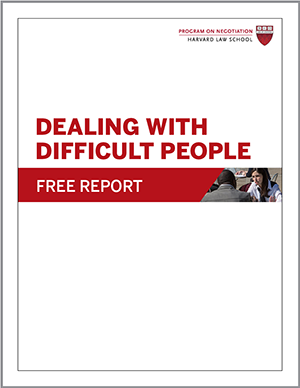
Difficult people: We’ve all met them, worked with them, even lived with them. There are the bosses who set unrealistic expectations and then lash out when you can’t meet them. The coworker who slacks off on a group project but takes credit during the presentation. The regular client who resorts to unethical negotiation tactics. And the relative who makes passive-aggressive comments rather than expressing their feelings directly.
When dealing with difficult people of all types, we tend to fall back on a variety of unhelpful patterns, such as complaining behind their back, suffering in quiet resentment, or lashing out with personal attacks. These reactions fail to account for the fact that, as the actress Tilda Swinton observed in an interview with the Globe and Mail, “nobody wants to be difficult. Nobody.” Swinton, who plays a prototypical “difficult person” in the film Problemista, continued, “People are difficult for good reason, to them.”
Communication and conflict resolution strategies offer productive and fruitful ways of handling difficult people—strategies that account for the fact that “difficult” is often in the eye of the beholder.
Consider the Context
When confronted with seemingly difficult people, we tend to blame them personally for whatever they said or did, especially if the behavior is chronic. Due in part to a widespread cognitive bias that psychologist Lee Ross coined the fundamental attribution error, we routinely overattribute other people’s behavior to their personalities rather than aspects of the situation in which they find themselves.
Interestingly, we tend to reach the opposite conclusion about our own behavior: When something goes wrong, we attribute it to some aspect of our environment rather than to an aspect of our personality. So, if a coworker is falling behind one week, we might conclude they are unmotivated and lazy. But if we fail to meet our own targets, we might blame a family crisis or supplier delays.
To avoid succumbing to the fundamental attribution error, consider whether the seemingly difficult people in your life might have good reason to behave as they do. If someone’s behavior seems to have changed for the worse, for example, they may be dealing with a tough situation at home.
Julio Torres, the writer and director of Problemista, told the Globe and Mail about a time when he tried such a thought exercise. “Just recently,” he said, “I turned a corner on the street, and I almost bumped into a woman. [She] scoffed and was so angry, even though it was 50/50 our fault. I became angry, too, marching away. Then I started imagining her life, what could have been going through her head. Now she’s in me forever. That’s the sentiment I like to bring to my work.”
On the flip side, recognize when you’re making excuses for your own behavior. If you’re habitually late for meetings, for instance, stop blaming coworkers and come up with a plan to correct the problem.
Account for Stereotypes
We are particularly likely to label people as difficult when they violate gender, racial, ethnic, and other identity-based stereotypes. For example, because of deeply ingrained stereotypes of women as communal and accommodating, subordinates might view a female boss who expresses herself directly (“I’m going to need this by tomorrow”) as more difficult than a female boss who prefaces her requests with softer language (“I’m so sorry to trouble you, but I’m afraid I’m going to need this by tomorrow”).
Swinton says that women are often labeled as difficult people. “Difficult means not easy—to what?” she says. “To railroad? It means visible. Not ignorable. Not biddable. Having to be dealt with.”
One way to check whether you might be assessing people against unfair stereotypes is to try the “flip it to test it” approach, described in a
TEDx talk by HR executive Kristen Pressner. To do so, advises Amy Gallo in a Harvard Business Review article about dealing with difficult coworkers, ask yourself these questions: “If your colleague was a different gender, race, or sexual orientation or had a different place in the hierarchy, would you make the same assumptions? Would you say the same things or treat that person the same way?” The same questions can be adapted to any seemingly difficult people you encounter in your life.
Toward a More Curious Mindset
Trying to debias how we look at the “difficult people” in our lives can open the door to more productive conversations, ones focused on solving shared problems. That might mean asking a friend whose behavior has bothered you lately if there is anything you can do to make their life easier, or suggesting to a coworker that you talk about how to lessen your shared frustration and work together more smoothly. Approaching someone with curiosity and compassion doesn’t guarantee they’ll be easier to deal with, but it will improve your odds of getting to the heart of the matter.
What other advice would you offer to those dealing with seemingly difficult people?





Comments are closed.